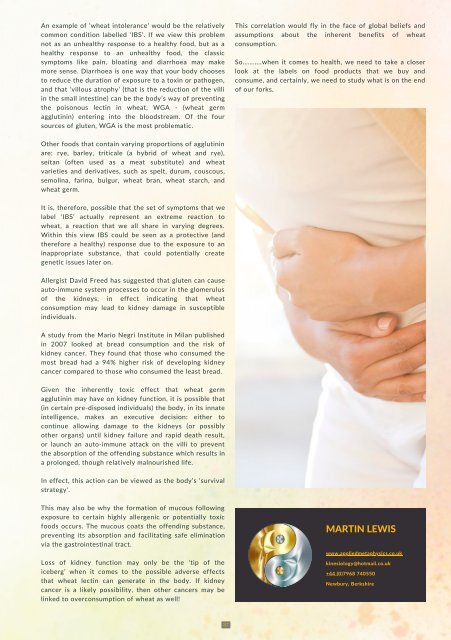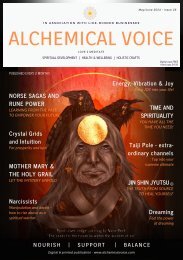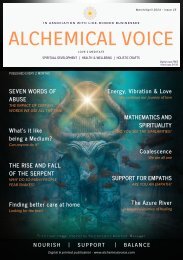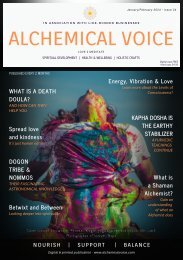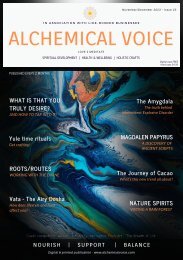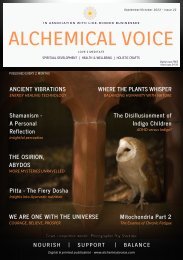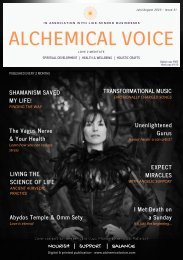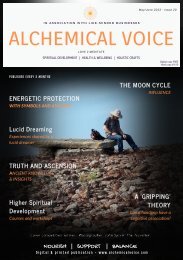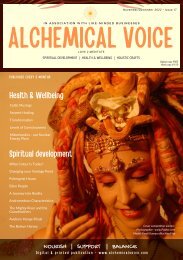May/June 2022 Alchemical Voice
In this edition: learn about Pagan Celebrations and crystals with Sarah Jane Dennis, Ho'oponopono by Jovi Hoonjan, Goddess of Light channelled message by Kathy Mingo, a Shamanic perspective on death by John Sjovik, a past life experience - The Mighty River and the Grandmothers' by Richard Pantlin, Healing Power of Plants by Meryl McArthur, 'Power vs Force' as researched by Dr David R Hawkins written by Julie de Vere Hunt, Is Wheat the food that makes us ill? by Martin Lewis, Daily Taoism by Silvia Siret, Energy flowing Mudras by Shamanic Joy UK, Kundalini Yoga by Roxy Ayling, Oracle card readings and a synopsis of the Awakening times by Oriel Lux, vegan recipes for summer by Love 2 Meditate, channelled poetry and rituals by Sue Penney of Soul Verse.
In this edition: learn about Pagan Celebrations and crystals with Sarah Jane Dennis, Ho'oponopono by Jovi Hoonjan, Goddess of Light channelled message by Kathy Mingo, a Shamanic perspective on death by John Sjovik, a past life experience - The Mighty River and the Grandmothers' by Richard Pantlin, Healing Power of Plants by Meryl McArthur, 'Power vs Force' as researched by Dr David R Hawkins written by Julie de Vere Hunt, Is Wheat the food that makes us ill? by Martin Lewis, Daily Taoism by Silvia Siret, Energy flowing Mudras by Shamanic Joy UK, Kundalini Yoga by Roxy Ayling, Oracle card readings and a synopsis of the Awakening times by Oriel Lux, vegan recipes for summer by Love 2 Meditate, channelled poetry and rituals by Sue Penney of Soul Verse.
- No tags were found...
You also want an ePaper? Increase the reach of your titles
YUMPU automatically turns print PDFs into web optimized ePapers that Google loves.
An example of ‘wheat intolerance’ would be the relatively<br />
common condition labelled ‘IBS’. If we view this problem<br />
not as an unhealthy response to a healthy food, but as a<br />
healthy response to an unhealthy food, the classic<br />
symptoms like pain, bloating and diarrhoea may make<br />
more sense. Diarrhoea is one way that your body chooses<br />
to reduce the duration of exposure to a toxin or pathogen,<br />
and that ‘villous atrophy’ (that is the reduction of the villi<br />
in the small intestine) can be the body’s way of preventing<br />
the poisonous lectin in wheat, WGA - (wheat germ<br />
agglutinin) entering into the bloodstream. Of the four<br />
sources of gluten, WGA is the most problematic.<br />
This correlation would fly in the face of global beliefs and<br />
assumptions about the inherent benefits of wheat<br />
consumption.<br />
So………..when it comes to health, we need to take a closer<br />
look at the labels on food products that we buy and<br />
consume, and certainly, we need to study what is on the end<br />
of our forks.<br />
Other foods that contain varying proportions of agglutinin<br />
are: rye, barley, triticale (a hybrid of wheat and rye),<br />
seitan (often used as a meat substitute) and wheat<br />
varieties and derivatives, such as spelt, durum, couscous,<br />
semolina, farina, bulgur, wheat bran, wheat starch, and<br />
wheat germ.<br />
It is, therefore, possible that the set of symptoms that we<br />
label ‘IBS’ actually represent an extreme reaction to<br />
wheat, a reaction that we all share in varying degrees.<br />
Within this view IBS could be seen as a protective (and<br />
therefore a healthy) response due to the exposure to an<br />
inappropriate substance, that could potentially create<br />
genetic issues later on.<br />
Allergist David Freed has suggested that gluten can cause<br />
auto-immune system processes to occur in the glomerulus<br />
of the kidneys, in effect indicating that wheat<br />
consumption may lead to kidney damage in susceptible<br />
individuals.<br />
A study from the Mario Negri Institute in Milan published<br />
in 2007 looked at bread consumption and the risk of<br />
kidney cancer. They found that those who consumed the<br />
most bread had a 94% higher risk of developing kidney<br />
cancer compared to those who consumed the least bread.<br />
Given the inherently toxic effect that wheat germ<br />
agglutinin may have on kidney function, it is possible that<br />
(in certain pre-disposed individuals) the body, in its innate<br />
intelligence, makes an executive decision: either to<br />
continue allowing damage to the kidneys (or possibly<br />
other organs) until kidney failure and rapid death result,<br />
or launch an auto-immune attack on the villi to prevent<br />
the absorption of the offending substance which results in<br />
a prolonged, though relatively malnourished life.<br />
In effect, this action can be viewed as the body’s ‘survival<br />
strategy'.<br />
This may also be why the formation of mucous following<br />
exposure to certain highly allergenic or potentially toxic<br />
foods occurs. The mucous coats the offending substance,<br />
preventing its absorption and facilitating safe elimination<br />
via the gastrointestinal tract.<br />
Loss of kidney function may only be the ‘tip of the<br />
iceberg’ when it comes to the possible adverse effects<br />
that wheat lectin can generate in the body. If kidney<br />
cancer is a likely possibility, then other cancers may be<br />
linked to overconsumption of wheat as well!<br />
MARTIN LEWIS<br />
www.appliedmetaphysics.co.uk<br />
kinesiology@hotmail.co.uk<br />
+44 (0)7968 740550<br />
Newbury, Berkshire<br />
37


